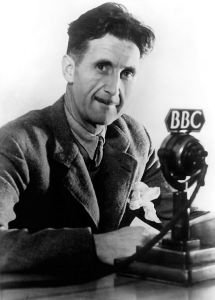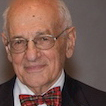It isn’t always the devil’s spawn. We can still smile at the Victorian prudery regarding biological functions that would describe a pregnant woman as being “in an interesting condition,” even though we ourselves preserve traces of it to this day when we “go to the bathroom” for purposes very different from bathing.
Let’s be clear. The purpose of language should be to clarify and explain the world as we see it. The distortion of language by any means is to obfuscate, deny, and sometimes to create blind worship of fallen idols. No one knew this better than the inventor of newspeak, doublespeak and the Ministry of Truth. In 1946, three years before he wrote Nineteen Eighty Four, George Orwell already had published his durable and brilliant essay, “Politics and the English Language,” which traced the ways in which bloated and vacuous writing serves the purposes of totalitarianism. Today, even sixty-eight years later, it has kept its power and freshness. It ought to be required reading for anyone who reads or writes, and in the interest of public service we reprint an excerpt here.
Excerpted From Orwell’s 1946 Essay: “Politics and the English Language”
In our time it is broadly true that political writing is bad writing. Where it is not true, it will generally be found that the writer is some kind of rebel, expressing his private opinions and not a ‘party line’. Orthodoxy, of whatever colour, seems to demand a lifeless, imitative style. The political dialects to be found in pamphlets, leading articles, manifestos, White papers and the speeches of undersecretaries do, of course, vary from party to party, but they are all alike in that one almost never finds in them a fresh, vivid, homemade turn of speech. When one watches some tired hack on the platform mechanically repeating the familiar phrases — bestial, atrocities, iron heel, bloodstained tyranny, free peoples of the world, stand shoulder to shoulder — one often has a curious feeling that one is not watching a live human being but some kind of dummy: a feeling which suddenly becomes stronger at moments when the light catches the speaker’s spectacles and turns them into blank discs which seem to have no eyes behind them. And this is not altogether fanciful. A speaker who uses that kind of phraseology has gone some distance toward turning himself into a machine. The appropriate noises are coming out of his larynx, but his brain is not involved, as it would be if he were choosing his words for himself. If the speech he is making is one that he is accustomed to make over and over again, he may be almost unconscious of what he is saying, as one is when one utters the responses in church. And this reduced state of consciousness, if not indispensable, is at any rate favourable to political conformity.
In our time, political speech and writing are largely the defence of the indefensible. Things like the continuance of British rule in India, the Russian purges and deportations, the dropping of the atom bombs on Japan, can indeed be defended, but only by arguments which are too brutal for most people to face, and which do not square with the professed aims of the political parties. Thus political language has to consist largely of euphemism, question-begging and sheer cloudy vagueness. Defenceless villages are bombarded from the air, the inhabitants driven out into the countryside, the cattle machine-gunned, the huts set on fire with incendiary bullets: this is called pacification. Millions of peasants are robbed of their farms and sent trudging along the roads with no more than they can carry: this is called transfer of population or rectification of frontiers. People are imprisoned for years without trial, or shot in the back of the neck or sent to die of scurvy in Arctic lumber camps: this is called elimination of unreliable elements. Such phraseology is needed if one wants to name things without calling up mental pictures of them. Consider for instance some comfortable English professor defending Russian totalitarianism. He cannot say outright, ‘I believe in killing off your opponents when you can get good results by doing so’. Probably, therefore, he will say something like this:
‘While freely conceding that the Soviet regime exhibits certain features which the humanitarian may be inclined to deplore, we must, I think, agree that a certain curtailment of the right to political opposition is an unavoidable concomitant of transitional periods, and that the rigors which the Russian people have been called upon to undergo have been amply justified in the sphere of concrete achievement.’
The inflated style itself is a kind of euphemism. A mass of Latin words falls upon the facts like soft snow, blurring the outline and covering up all the details. The great enemy of clear language is insincerity. When there is a gap between one’s real and one’s declared aims, one turns as it were instinctively to long words and exhausted idioms, like a cuttlefish spurting out ink. In our age there is no such thing as ‘keeping out of politics’. All issues are political issues, and politics itself is a mass of lies, evasions, folly, hatred, and schizophrenia. When the general atmosphere is bad, language must suffer. I should expect to find — this is a guess which I have not sufficient knowledge to verify — that the German, Russian and Italian languages have all deteriorated in the last 10 or 15 years, as a result of dictatorship.
Visit the official George Orwell website to read the complete essay.




